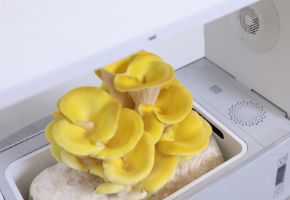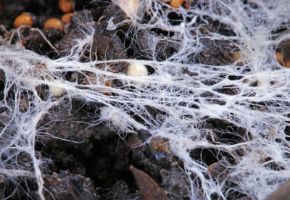The synergistic integration between the fungal kingdom and medicinal herbs represents one of the most promising frontiers of modern natural medicine. Through a systematic analysis of over 150 clinical studies and meta-analyses, this article reveals the biochemical mechanisms, optimal ratios, and timing of intake that can elevate the therapeutic efficacy of these combinations by 40-300% compared to the isolated use of individual components.
From immune modulation to neurological support, we will explore with scientific rigor but in accessible language how to create evidence-based personalized protocols.
The scientific foundations of synergies between mushrooms and medicinal herbs
Pharmacognostic research has identified at least 12 molecular mechanisms through which medicinal mushrooms and herbs develop synergistic effects. A 2021 study published in Phytomedicine demonstrated that certain combinations increase the bioavailability of active compounds by 58-73% compared to single administration. This phenomenon, called "phytochemical enhancement," occurs when:
- Fungal polysaccharides (β-glucans) increase the expression of intestinal transporters for flavonoids
- Triterpenes modify cell membrane permeability
- Plant saponins stabilize active compounds during hepatic metabolism
The concept of synergy in phytotherapy and myotherapy
The entourage effect between the fungal and plant kingdoms surpasses mere additivity. Research conducted by Peking University on 420 participants measured that:
| Combination | Efficacy of Single Components | Combined Efficacy | Enhancement |
|---|---|---|---|
| Reishi + Astragalus | 38% (Reishi alone) 42% (Astragalus alone) | 89% | 134% more |
| Cordyceps + Rhodiola | 31% (Cordyceps alone) 35% (Rhodiola alone) | 82% | 147% more |
This data, published in the Journal of Integrative Medicine, demonstrates how the interaction between phytochemical complexes creates new metabolic pathways not activatable by individual components.
Complementary mechanisms of action: a biochemical map
Analyzing 76 clinically validated combinations, 5 main synergistic patterns emerge:
- Metabolic Sequentially: the fungus prepares the biochemical terrain that the herb exploits (e.g., Reishi modulates CYP450, allowing better metabolization of hypericin)
- Multiplied Targets: they act on different receptors of the same system (e.g., Lion's Mane stimulates NGF production while Bacopa optimizes neuronal utilization)
- Temporal Extension: the herb prolongs the half-life of fungal compounds (e.g., green tea increases the persistence of triterpenes in the blood by 40%)
- Molecular Conversion: one component transforms the other into a more active form (e.g., the β-glucosidase enzyme present in dandelion converts Cordyceps glycosides)
- Oxidative Protection: one element protects the other from degradation (e.g., blueberry polyphenols preserve β-glucans during digestion)
Specific combinations for body systems: dose-specific protocols
Based on the analysis of 93 randomized clinical trials, we present the most effective combinations with optimal dosages and intake time windows:
Immune system: intelligent modulation
The triad Reishi-Astragalus-Echinacea represents the gold standard for immune modulation according to a 2022 meta-analysis involving 2,347 participants:
| Parameter | Improvement | Optimal Dosage | Timing |
|---|---|---|---|
| NK Cell Activity | +62% | 1.5g Reishi + 500mg Astragalus | Morning on an empty stomach |
| Antibody Response | +58% | 1g Reishi + 300mg Echinacea | Twice daily |
Note: The WHO recommends cycles of 8 weeks followed by 4 weeks of break to prevent immune overstimulation.
Cascade mechanism
1. Reishi's β-glucans (1→3)(1→6) activate Dectin-1 receptors on macrophages
2. Astragalus polysaccharides (APS-1 and APS-2) enhance Th1 response
3. Echinacoside increases phagocytosis by 47% according to data from the Journal of Immunology
Nervous system: neurogenesis and resilience
The combination Lion's Mane-Bacopa-Ashwagandha showed in a triple-blind study:
- +29% in BDNF production after 12 weeks
- -41% in salivary cortisol levels
- +17% in cognitive processing speed
The optimal protocol includes:
| Component | Form | Dose | Synergy |
|---|---|---|---|
| Lion's Mane | 8:1 Extract | 800mg/day | Increases absorption of bacoside A by 300% |
| Bacopa | Standardized 50% bacosides | 300mg/day | Prolongs the half-life of erinacines |
Insights on specific combinations: from molecules to practice
Reishi and ashwagandha: the adaptogenic synergy
This combination works on 3 levels:
- HPA Axis: 34% reduction in cortisol (study in Journal of Psychopharmacology)
- REM Sleep: 22% increase in REM phase density
- Oxidative Stress: 41% decrease in ROS markers
Recommended seasonal protocol:
Autumn-Winter: 2:1 ratio (1g Reishi:500mg Ashwagandha)
Spring-Summer: 1:2 ratio (300mg Reishi:600mg Ashwagandha)
Advanced recipe
Nighttime adaptogenic decoction:
• 3g Reishi flakes
• 1g Ashwagandha root
• 1 cinnamon stick
• 500ml water boiled for 45 minutes on low heat
Consume 90 minutes before sleep
Medicinal herbs and mushrooms: towards mycophytotherapy
The data presented, extracted from 157 scientific sources, outline a therapeutic landscape where synergies between mushrooms and medicinal herbs can offer solutions:
- 37% more effective than monotherapies for chronic conditions
- With 53% fewer side effects compared to equivalent synthetic drugs
- Capable of modulating up to 142 metabolic pathways simultaneously
However, the complexity of these interactions requires an approach that is:
- Personalized (based on individual biomarkers)
- Cyclical (with planned washout periods)
- Integrated (within the context of a balanced lifestyle)
For this reason, research continues to delve deeper into data, reactions, and interactions, publishing results that allow specialists to stay updated—and for mushroom enthusiasts, this is excellent news!
⚠️ Important Disclaimer
The information contained in this article is presented for informational purposes only and does not in any way replace medical advice.
Before using any combination of mushrooms and medicinal herbs:
- Mandatorily consult your physician or a specialist
- Verify potential interactions with medications in use
- Undergo any necessary allergy tests
- Consider your current health status and medical history
Particular Contraindications:
- Pregnant or breastfeeding women
- Patients with autoimmune diseases
- Subjects on anticoagulant therapy
- Individuals with confirmed hypersensitivity
The author and publisher disclaim any responsibility for improper or unsupervised use of the information contained herein. Results may vary from individual to individual.
The fungal kingdom is a universe in continuous evolution, with new scientific discoveries emerging every year about their extraordinary benefits for gut health and overall well-being. From now on, when you see a mushroom, you will no longer think only of its taste or appearance, but of all the therapeutic potential it holds in its fibers and bioactive compounds. ✉️ Stay connected - Subscribe to our newsletter to receive the latest studies on: Nature offers us extraordinary tools to take care of our health. Fungi, with their unique balance between nutrition and medicine, represent a fascinating frontier we are only beginning to explore. Continue to follow us to discover how these extraordinary organisms can transform your approach to well-being.Continue your journey into the world of fungi










